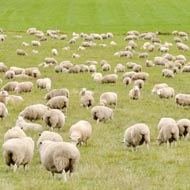EU exit would be 'catastrophic' for Wales, says minister

Rebecca Evans has reiterated her concerns for the future of the farming industry in Wales.
The deputy minister for farming and food in Wales has reiterated her concerns for the future of the farming industry in Wales in the event of an out vote in the forthcoming referendum on membership of the European Union.
With payments under CAP worth £240m to farmers each year, Rebecca Evans said that if funding was to cease without any realistic prospect of the same level of domestic replacement from the UK Government, or if a sufficient period of time to allow farm businesses to alleviate the financial loss, it would be hugely damaging to the industry.
"I have followed with interest the many discussions on European membership in the media and have been alarmed at the number of commentators who naively believe agriculture would see a reduction in so called 'red tape' and that the industry would continue to receive the same level of financial support were we to leave the EU," said Rebecca.
"In fact, withdrawal from the EU, and the impact that this would undoubtedly have in respect of the CAP, would be catastrophic for Welsh agriculture."
Ms Evans made the comments ahead of this years' Royal Welsh Agriculture Show. Last week, she officially launched the Welsh Government Rural Communities - Rural Development Programme 2014 - 2020. The £900m programme is co-funded by the Welsh Government and the European Union and several new and important initiatives are due to open during Show week.
Three of the support mechanisms, which total £20m of support, opened on Monday - a sustainable Production Grant, a Food Business Investment Scheme and a Rural Community Development Fund (RDP). Announcing the initiatives, Rebecca highlighted the importance of a united approach with the agriculture industry to insure that the outcomes sought are fully realised:
"Last week I launched Welsh Government Rural Communities which will be more ambitious, innovative, and adaptable than previous programmes and will stimulate rural economies, enhance our natural resources and make a lasting difference to the lives of people all over Wales.
"This programme is a fantastic opportunity to support rural Wales and it further demonstrates the benefits of our EU membership. The previous RDP has already invested nearly £800 million into Welsh communities and rural business and I am determined to make the most of these opportunities. If we were to leave the EU our efforts to support our farmers and to realise our shared vision of a modern, professional, and prosperous farming industry in Wales, would be severely disadvantaged."



 The veterinary mental health charity Vetlife is inviting the veterinary community to join it for a sponsored cold-water dip.
The veterinary mental health charity Vetlife is inviting the veterinary community to join it for a sponsored cold-water dip.